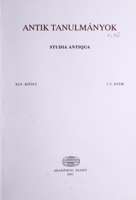A saecularis gondolat mint irodalomalakító tényező Rómában
Secular thought as a literature creating factor in Rome
Author(s): László HavasSubject(s): Cultural history, Studies of Literature, Ancient World, Philology
Published by: Akadémiai Kiadó
Keywords: history; ancient world; Rome; Cicero; literature;
Summary/Abstract: The author had already demonstrated in a previous essay of his, that Cicero’s De re publica was written in the period, when, either we take the new time of Atticus-Varro (753 BC) or the earlier time of Cato Senior (751/750 BC) as a basis, Rome celebrated the 700th anniversary of its existence. From this point of view the Ciceronian dialogue is an occasional work, which was made for the jubilee of Rome, yet in order to find a remedy for the Roman state facing such a crisis, so to speak a fatal danger. Cicero, from this viewpoint, would have been ready to take the special role of the moderator or the rector rei publicae (cf. rep., 2,52), of the person, who depends on his own honor and authority in the first place without any official commission. In this respect he renewed Cato Senior’s intellectual inheritance, who published his Origines in a last, revised form in 149 BC, because on the one hand he wanted to introduce the glory of Rome, which city was born exactly 600 years earlier according to Cato’s chronology, on the other hand Cato himself, not as a magistratus, but as the owner of his ancient authority, wanted to keep the state in balance, moreover to improve its situation. At the same time Cicero’s state ideal seems to be closer to Scipio Aemilianus’ conception indeed, that is why the author makes him the leading character of the dialogue, furthermore he dates the imaginary discussion to 129 BC, when Rome celebrated the 600th anniversary of its foundation according to Cincius Alimentus’ chronology. By so doing the author of De re publica uses more time levels, confronting 149 BC, 129 BC and 53/51 BC, and all of these dates can be understood as certain Roman anniversaries. This essay demonstrates that Cicero wanted to present actually his own consular year, 63 BC as annus fatalis, and by this he partly continued the initiative of Marius and Sulla, preparing at the same time Augustus’ ideology connected to the ludi saeculares of 17 BC, which considerably determined the whole mentality of Roman literature in the early period of empire. Therefore the saecularis idea can be rightly considered to be the Roman civilization’s literature creating factor.
Journal: Antik Tanulmányok
- Issue Year: 45/2001
- Issue No: 1(2)
- Page Range: 75-112
- Page Count: 38
- Language: Hungarian
- Content File-PDF

